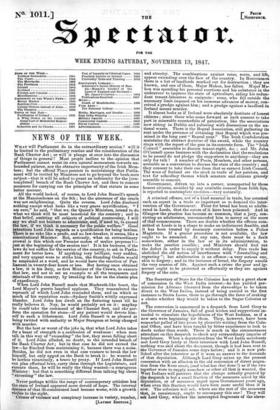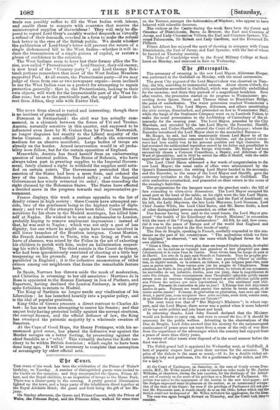The Secretary of State for the Colonies has made a
!great show of concession to the West India interest—he has yielded per- mission for Africans liberated from the slave-ships to be taken direct to the West Indies, instead of being carried in the first instance to Sierra Leone, there to go through the farce of making a choice whether they would be taken to the Sugar Colonies or not.
The concession is announced in a despatch from Lord Grey to the Governor of Jamaica, full of good wishes and suggestions in- tended to stimulate the hopefulness of the West Indians, as if a new aira were beginning for them. They, however, have been somewhat palled of late years by plausible writing. from the Colo- nial Office, and have been taught by bitter experience to look to deeds rather than words. There is much in the circumstances attendant on this despatch to check any extraordinary impulse of hopefulness. When a deputation from the West India merchants met Lord Grey lately at their interview with Lord John Russell, nothing was said about the document, though it had been sent to the Governor of Jamaica some days before ; and it is now pub- lished after the interview as if it were an answer to the demands of that deputation. Although Lord Grey mixes Op the present concession with an allusion to the old concession of direct migra- tion from the Kroo coast, (and what has that done ?) as if the two together were to supply somehow or other all that is wanted, the West Indians will perceive that the change actually granted by the despatch is but a small fraction of the measures asked by the deputation, or of measures urged upon Government years ago, when even this fraction would have been more useful than it is now. The colonists will ask, where are the rest of the measures that, in consistency, ought to accompany this one ? They will ask Lord Grey, whether the intercepted fragments of the slave-
trade can possibly suffice to fill the West Indies with labour, and enable them to compete with countries that receive the =intercepted supplies of slave-labour ? They will only bed.. posed to regard Lord Grey's amiably worded despatch as virtually a refusal of their demands, couched in a form to make the refusal look better in the eyes of the British public. We doubt whether the publication of Lord Grey's letter will prevent the return of a single dishonoured bill to the West Indies—whether it will in- duce the transmission of a single guinea of capital, or restore a gleam of confidence to the colonists. The West Indians seem to have lost their former allies the To- ries, now called "Protectionists." Lord Stanley, their old enemy, is now head of the " Country party "; and Lord George Ben- thick perhaps remembers that most of the West Indian Members supported Peel. At all events, the Protectionist party—if we may judge of them from one or two newspaper organs—seem inclined to use the West Indian case as a pretext for attempting to regain protection generally : that is, the Protectionists, looking to their own objects, will work for the impracticable part of the West In- dian case; but as to the practicable part, the supply of labour di- rect from Africa, they side with Exeter Hall.



























